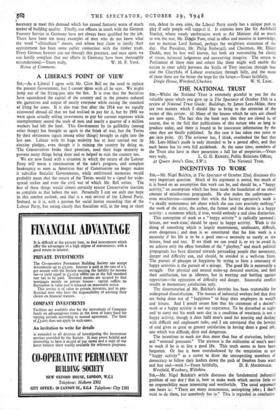INCENTIVES TO WORK
SIR,—Mr. Nigel Balchin, in The Spectator of October 22nd, discusses this very important question. Much of his argument is sound, but much of it is based on an assumption that work can be, and should be, a "happy activity," an assumption which has been made the foundation of no small amount of mischievous propaganda. He also makes the unfortunate— even mischievous—statement that while the factory operative's work is "a deadly monotonous job about which she can care precisely nothing," the work of the artist, the author, the farmer and the doctor is a happy activity: a statement which, if true, would embody a real class distinction.
This conception of work as a "happy activity" is radically unsound ; leisure, not work-time; should be spent in happy activity. Work is the doing of something which is largely monotonous, unpleasant, difficult, even dangerous ; and man is so constituted that for him work is a necessity if his life is to be a good one—a necessity as surely as are leisure, food and rest. If we think we can avoid it, or try to avoid it, we achieve only the effete boredom of the "playboy," and much political propaganda has been directed towards persuading people that monotony, danger and difficulty can, and should, be avoided in a well-run State. The pursuit of pleasure or happiness by trying to have a constancy of happy activities is the pursuit of a mirage. The good life is necessarily a struggle. Our physical and mental make-up demand exercise, and find their satisfaction, not in idleness, but in meeting and battling against opposition—the opposition of difficulty and danger. Successful conflict results in momentary satisfaction only.
The dissemination of Mr. Balchin's doctrine has been responsible for widespread dissatisfaction. The masses of industrial workers feel that they are being done out of " happiness " to keep their employers in wealth and leisure. And I would assure him that his statement of a doctor's work as a happy activity is not my experience. To be disturbed at night and to carry out his work next day in a condition of weariness is not a happy activity, though it does fulfil man's need for meeting and dealing with difficult and unpleasant tasks, and I am convinced that the hewing of coal gives as great or greater satisfaction in having done a good job, one which was difficult, dirty and dangerous.
The incentives to work are thus more than fear of starvation, bribery and "external pressures." The greatest is the realisation of man's need to work if he is to live a good life. This truth seems to have been forgotten. Or has it been overshadowed by the temptation to use "happy activity" as a carrot to draw the unsuspecting members of democracy to follow their leaders down the path of freedom from want
and fear and—work ?—Yours faithfully, D. S. MACDONALD. Westfield, Westbury, Wiltshire.


































 Previous page
Previous page